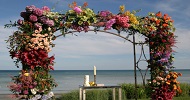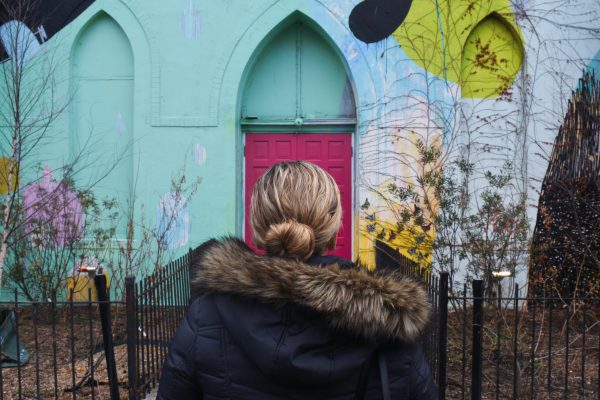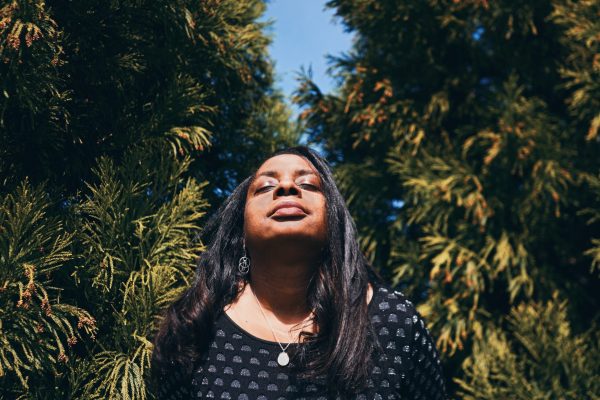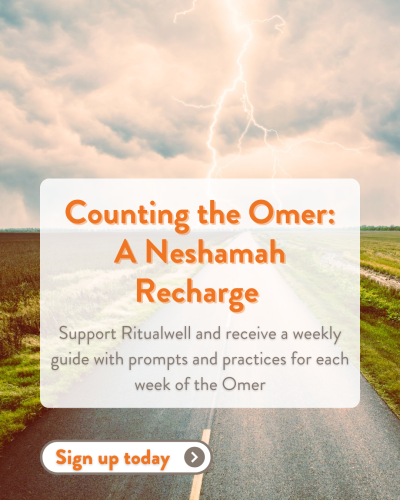The following ritual was created as a resource for couples who have been in a committed long-term relationship who wish to participate in a Jewish version of “renewing the vows.” Unlike a Christian wedding, there are no vows taken or made between partners in a Jewish wedding. Rather, the Jewish marriage ceremony reflects the sacred joining together of two people, blessed by God and their community.
This ceremony can help guide you to create your own ritual to celebrate an anniversary or life change or to re-commit after a particular trying time or marital crisis.
I have based the format of the ceremony on that of a wedding, retaining some of the basic elements and using symbols which, in our tradition, reflect God, home and Torah. I have also used traditional blessings in non-traditional ways, for circumstances other than those usually intended for those benedictions.
I invite you to use the ceremony below as a starting point, an impetus for the exercise of your own imagination to create something meaningful for you. Embrace your own vision as well as traditions, symbols, readings, objects and elements which resonate with your own personal concept of the holy.
A wonderful video which reflects the love between long married partners is Leonard Cohen’s “Dance Me to the End of Love” available on youtube.
MIKVEH
It is suggested that each partner immerse in a mikveh prior to the ceremony to mark the occasion as a sacred renewal, much as is done in preparation for a wedding.
BEDECKEN
The partners are seated on chairs to be approached and greeted by their guests.
Their children, other guests, or the officiant, approach the couple, put a hand on each of their heads and gives the blessing:
יְשִׂימְכֶם אלוקים כְּאַבְרָהָם וְשָׂרָה אַשֶׁר בָּנוּ אֶת בֵּית יִשֽׂרָאֵל
Yismeykhem eloheynu k’avraham v’sarah asher banu et beit Yisrael.
May God bless you as He did Abraham and Sarah, who together built the house of Israel.
PROCESSIONAL
The couple rise and walk, hand and hand, to the huppah while the officiant/guests sing:
מִי אַדִיר עַל הַכֹּל מִי בָּרוּך עַל הַכֹּל מִי גָדוֹל עַל הַכֹּל הוּא יְבָרֵךְ אֶת הָאַהוּבִים
Mi adir al hakol mi barukh al hakol mi gadol al hakol hu y’varekh et ha’ahuvim.
He who is powerful above all, who is great above all, who is supreme above all,
may He bless these beloved companions.
and/or hum a niggun of their choice.
The officiant recites:
בְּרוּכִים הַבָּאִים בְּשֵׁם ה׳ רֵעִים אֲהוּבִים
.מִי אַדִיר עַל הַכֹּל מִי בָּרוּך עַל הַכֹּל מִי גָדוֹל עַל הַכֹּל הוּא יְבָרֵך אֶת הַרֵעִים הָאַהוּבִים
B’rukhim ha’baim b’shem Adonay reyim ahuvim
Mi adir al hakol mi barukh al hakol mi gadol al hakol hu y’varekh et ha’reyim ha’ahuvim.
Blessed in God’s name are these beloved companions who come before us.
He who is powerful above all, who is great above all, who is supreme above all,
may He bless these beloved companions.
(For the ceremony, the couple faces each other.)
BLESSINGS
1) The blessing is made on a cup of wine:
בָּרוּךְ אַתָּה ה׳ אֶלוֹקֵינוּ מֶלֶךְ הָעוֹלָם בּוֹרֵא פְּרִי הַגָפֶן
Barukh atah Adonay Eloheynu melekh ha’olam, borey p’ri hagafen.
Blessed are You, oh God, who created the fruit of the vine.
2) To symbolize the candles lit to light the home on Shabbat and holidays, as well as the fire which symbolizes the “light of the soul” and the Eternal Presence, each partner takes a lit candle and together they light a third, joining the flames and their souls, as one partner, or both, recite from the selections below:
נֵר ה׳ נִשְׁמַת הֶאָדָם
Ner Adonay nishmat hey’adam.
The light of God is the soul of man
לֹא אִישׁ בְּלֹא אִשָׁה וְלֹא אִשָׁה בְּלֹא אִישׁ וְלֹא אשְׁתֵּיהֶם שְׁכִינָהבְּלֹ
Lo ish b’lo i’sha v’lo isha b’li ish v’lo ishtehem a’khinabel.
Not a man without woman nor a woman without a man, nor the two together without the presence of God.
“God made the soul as a sphere cut in two, half in one body, half in another. When the halves come together, the primordial, original love is aroused; that love which existed before time and space.”
(Adapted from kabbalistic quote found in Kitvai HaRambam and Moshe Idel, Kabbalah and Eros)
3) The officiant, family members or guests recite from the selections below:
(Adapted from the Central Conference of American Rabbis Rabbi’s Manual):
מִי שֶׁבֵּרַךְ אֲבוֹתֵינוּ אַבְרָהָם יִצְחָק וְיַעַקֹב וְאִיְמוֹתֵינוּ שָׂרָה רִבְקָה
רָחֵל וְלֵאָה,הוּא יְבָרֵךְ אֶת הָרֵעִים הָאַהוּבִים וְיַצְלִיחַ אֶת דַרְכָּם אַשֶׁר יֵלְכוּ בָּה הַיוֹם מֵ וָהָלְאָה יַחְדָו
.וְשַׁלְוָה בְּלִבּוֹתָם כָּל הַיָמִים אֲשֶׁר הֵם חַיִים עַל הָאַדָמָה
וְיַאַרִיךְ יְמֵי הֶם. בַּנְעִימִים וְיִשְׁלַח
.בְּרָכָה וְהַצְלָחָה בְּכָל מַעַשֵׂה יְדֵיהֶם עִם כָּל יִשְׂרָאֵל אֲחֵיהֶם וְנֹאמַר: אָמֵן
Mi sheberakh avoteynu Avraham Yitzkhak v’Yaacov v’imoteynu Sarah Rivkah
Rakhel v’Leah, hu y’varekh et ha’reyim ha’ahuvim v’yatzlikha et darcam asher yeylkhu bah hayom mey va’hal’ah yakhdav
v’salvah b’libotam kol ha’yamim asher hem khaim al ha’adamah.
V’ya’arikh y’mey hem. Ban’imim v’yislakh
b’rakhah v’hatzlakha b’khol ma’aseh y’deyhem im kol Yisrael akheihem v’nomar: Amen.
May God who blessed our fathers Abraham, Isaac and Jacob, and our mothers Sarah, Rebecca, Rachel and Leah, bless this couple. Guide them further on their life’s journey. Together let them find favor in the eyes of those who see them together and let them continue to build a Jewish home worthy of praise where they will find tranquility in their hearts all their lives.
May all their endeavors be blessed.
God, the source of all life, bless this couple. May the love that binds them be strong and lasting and let their hearts be filled with patience and understanding for one another.
May their home continue to be a sanctuary built on devotion to God, Torah and Israel.
May they be blessed with a long life together filled with good health, good fortune, adventure and peace, their love and friendship continuing to deepen through the years.
(Adapted from Rabbinical Assembly Rabbi’s Manual and the Central Conference of American Rabbis Rabbi’s Manual):
May God who blessed our ancestors, Abraham, Isaac, Jacob, Sarah, Rebecca, Rachel and Leah,
bless __________________ and _________________, who are here today with gratitude for all the blessings their years together have afforded them. May God protect them and may they continue to enjoy God’s blessings, witnessing their descendants occupying themselves with Torah and mitzvot. Grant them benediction and success in all their endeavors, embraced by the love of their children/ grandchildren/ great- grandchildren and other loved ones, so they may live in joy, peace and companionship. Amen.
May God who blessed our ancestors, bless ____________________ and ___________________.
They have been privileged to build a Jewish home filled with love and harmony, peace and partnership. They are blessed with children/grandchildren/ great-grandchildren growing up in health and happiness, loving Torah and performing acts of lovingkindness. They are here today in gratitude for all the kindness which God has bestowed upon them since their wedding day. May God continue to watch over them and protect them from any sorrow and distress. May they enjoy good health together for many years to come.
(Adapted from the Reconstructionist Rabbinical Association Rabbi’s Manual):
Our God and God of our ancestors, our hearts are filled with joy and gratitude as we look back over the years that ________________ and _________________ have shared together in marriage. Source of Life, we know that these years have allowed them to grow as individuals and as a couple, inspired by the wisdom of those who came before, strengthened by the support of the community and nurtured by the love they share together and with their children/ grandchildren/ great-grandchildren.
4) The couple recites together (from Hosea 2:21-22):
וְאֵרַשׂתִּיךְ לִי לְעוֹלָם וְאֵרַשׂתִּיךְ לִי בְּצֶדֶק וּבְמִשְׁפָּט
וּבְחֶסֶד וּבְרַחַמִים וְאֵרַשְׂתִּיךְ לִי בֶּאֱמוּנָה וֽיָדַעַתְּ ה׳אֶת
V’eirastikh ki l’olam v’eirastikh li b’tzedek u’vmishpat
u’vkhesed u’vrakhamim v’eireastikh li be’emunah v’yada’at hai’et.
I betroth you to me forever,
I betroth you to me with steadfast love and compassion,
I betroth you to me in faithfulness.
READINGS & RECITATIONS
1) The couple can read something they wrote, a poem, song lyrics etc., and/or a child of the couple or a guest can read something original, adapted or copied. Ecclesiastes 3:1–8 is also suggested.
(See Appendix E below for suggestions about to compose a meaningful recitation.)
2) The couple recites (from Jeremiah 2:2):
זָכַרְתִּי לָךְ חֶסֶד נְעוּרַיִךְ אַהֲבַתְּ כְּלוּלֹתָיִךְ לֶכְתֵּךְ אַחֲרַי בַּמִדְבָּר בָּאָרֶץ לֹא זְרוּעָה
Zarkharti lakh khesed n’urayikh ahavat k’lulotayikh lekhtekh akharey bamidbar b’aretz lo z’ruah.
I remember the love of your youth, the devotion of your commitment,
how you followed me in the wilderness in a land not known.
3)
בָּרוּךְ אַתָּה ה׳ אֶלוֹקֵינוּ מֶלֶך הָעוֹלָם הַטוֹב וְהַמֵיטִיב
Barukh atah Adonay Eloheynu melekh ha’olam hatov v’hameitiv.
Blessed are you God, king of the universe, who is good and beneficent.
4)
בָּרוּךְ אַתָּה ה׳ אֶלוֹקֵינוּ מֶלֶך הָעוֹלָם שֶׁהֱחֱיָנוּ וְקִיְמָנוּ וְהִגִיעָנוּ לַזְמַן הָזֶה
Barukh atah Adonay Eloheynu melekh ha’olam shehekheyanu v’kimanu v’higianu lazman hazeh.
Blessed are you God, king of the universe
who has kept us alive, sustained us and brought us to this day.
5) As a symbol of the home and the life they have built together, committed to each other, to their family, to their community, to God and the Torah, the couple exchange mezuzot or display a mezuzah in the form of jewelry, a wall mezuzah or wall hanging.
They recite that part of the Shema prayer which refers to mezuzah and to the value and importance of keeping the Torah holy and passing on its wisdom:
וְאָהַבְתָּ אֶת ה׳ אֶלֹקֶיךָ בְכֹל לְבָבְךָ וּבְכֹל נַפְשְׁךָ וּבְכֹל מְאֹדֶךָ וְהָיוּ הַדְבָרִים הָאֵלֶה
אַשֶׁר אָנֹכִי
מְצַוְךָ הַיוֹם עַל לְבָבֶךָ וְשִׁנַנְתָּם לְבָנֶיךָ וְדִבַּרְתָּם בָּם…וּכְּתַבְתָּם עַל מֽזוּזוֹת בֵּיתֶךָ וּבִשְׁעָרֶיךָ
V’ahavata et Adonay eloheykha b’khol l’vavekha u’vakhol nafshekha u’vakhol m’odekha v’hayu hadevarim haeleh
asher anokhi
m’tzevekha hayom al l’vaveykha v’shantam l’vaneykha v’dibartam bam…u’khtavtam al m’zuzot beytekha u’visharekha.
And you shall love God with all your heart, with all your soul and all your resources.
Let these matters that I command you today be upon your heart.
Teach them to your children…..and write them on the doorposts of your house and gates.
SHEVA BRAKHOT
The traditional Sheva Brakhot (seven wedding blessings) are recited by family members and guests. Since these blessings are not being used for their original purpose, some may prefer to substitute “Hamakom” (an appellation often used for God; literally “the place,” figuratively, the one who guides the cosmos) for “shem Hashem” (the holy name of God.) “Reim haahuvim” (beloved companions) may also be substituted for “hatan v’kallah” (bride and groom) if preferred.
APPENDIX E
The couple might consider the following as they write a statement:
- What did they look forward to at their wedding and how did it play out?
- What values do they share and have they lived by?
- What surprises were in store?
- What do they look back on with happiness? With regret?
- What are their hopes for the future?
- What challenges do they anticipate?
Children or friends of the couple might consider the following as they write a statement:
- What have I learned from this couple?
- How has their life together influenced my life?
- What values have they represented to me?
- What do I wish them?













